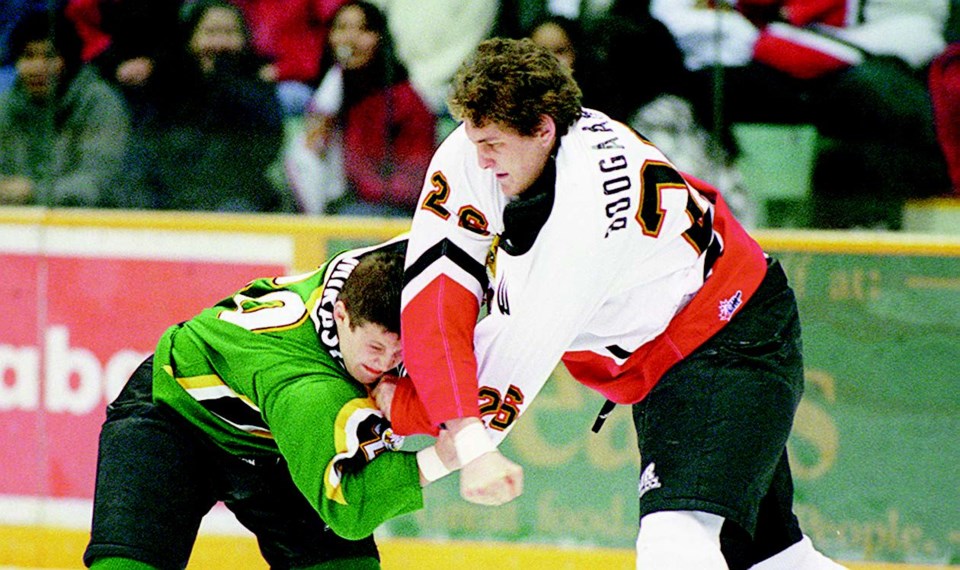Derek Boogaard was found dead in a hotel room two years ago Monday, the victim of an accidental overdose of prescription painkillers washed down with booze.
During his three-year junior career with the Prince George Cougars, before moving on to an unlikely 277-game career in the NHL, the Boogey Man was a terror on skates across the Western Hockey League. The above picture, taken during a November 2000 game at CN Centre against the Prince Albert Raiders, is indicative of the regular show Boogaard put on during his Cougars career, back in the day when the team sold out the rink. When Boogaard dropped his gloves, everyone jumped to their feet.
To paraphrase comedian Russell Peters, somebody was about to get a hurt real bad.
The big man was known as a gentle giant away from the rink. A former Cougars teammate called him "the biggest teddy bear ever."
But when he put on his Cougars jersey, it was his job to keep his teammates safe and the other team in line with his intimidating size and, if necessary, with his powerful fists. In light of his death, at the ridiculously young age of 28, it appears it was no one's job to keep him safe.
Look at the photo again and don't be fooled by his size. He's six-foot-seven tall and weighs 250 pounds but he's just 18-years-old. He's still not old enough to order a drink in a bar but it is alright for him to beat the snot out of opposing players. In any other public context, he would have been thrown in jail for that kind of behaviour but in the sick, twisted tradition of hockey fighting, he was praised for his exploits.
Boogaard went on to the NHL, first with the Minnesota Wild and then the New York Rangers, where he fought at least 66 times. That doesn't inclulde the scraps he got into during his three-year junior career and his three years with minor league teams. It's safe to say that Boogaard got into far more than 100 bare-knuckle fights during his career. It's also safe to say he didn't win every one of them.
After his death, Boogaard's parents donated his brain to researchers at the Boston University School of Medicine, where he was posthumously diagnosed with chronic traumatic encephalopathy. That's a fancy, lots-of-extra-sylllables way of saying that all of those shots to the head he took over all those years physically damaged his brain.
His parents have now sued the NHL for the wrongful death of their son. According to the lawsuit, he received an incredible 1,021 prescriptions from team physicians, dentists, trainers and staff during his 2008-2009 season with the Wild.
Their legal action joins a massive lawsuit that was filed against the National Football League last year by thousands of former players for brain injuries suffered during their playing careers.
Both of these lawsuits have the potential to change their respective games for the better, by putting the focus of hockey and football on skill, speed and strength, not mindless violence.
Lawyers and judges can't bring Boogaard back to his family but maybe they can force the multi-billion-dollar sports leagues to do more to protect future players.



